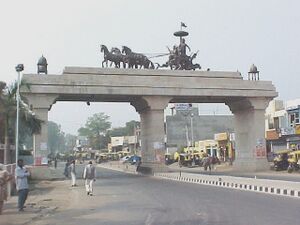Kurukshetra War

Historicity of the Kurukshetra War
Excavation at Hastinapur, Kurukshetra and Surrounding sites
Hastinapur and Surroundings: Excavations were conducted at Hastinapur (29°9'; 78°3', Dt Meerut ,Uttar Pradesh ) in 1950-52 by B.B.Lal on behalf of the ASI. Hastinapur, which is located between Meerut and Mawana in Uttar Pradesh is now a forgotten village, but the 1952 excavations revealed a few interesting discoveries which are highly debatable as whether they can be really correlated with the Mahabharata period.
After the archaeological excavations at ‘Vidura-ka-tila’, a collection of several mounds ,some being 50 to 60 feet high and extending a few furlongs, named after Vidura, a site 37 km (23 miles) north-east of Meerut, it was concluded to be remains of the ancient city of Hastinapur, the capital of Kauravas and Pandavas of Mahabharata, which was washed away by Ganges floods. In the archaeological excavations around hastinapur, about 135 iron objects which included arrow and spearheads, shafts, tongs, hooks, axes, and knives were found, which indicate the existence of a vigorous iron industry. There are indications of brick – lined roads and drainage systems, and an agro – livestock based economy. The painted grey ware (PGW) of Hastinapura has been assigned to 2800 BCE and beyond.
Further excavations at what is today referred to as Draupadi–ki–rasoi (Draupadi’s Kitchen) and Draupadi Ghat resulted in the finding of copper utensils, iron seals, Ornaments made of gold and silver, terracotta discs and several oblong shaped ivory dice used in the game of chauper, all dating to around 3000 BC. These places are visited frequently by tourists since the excavations.
Kota venkatachalam assigns 3138 B.c., as the year of Mahabharata War according to the calculations based on the movement of saptarishi mandala given in the text of Mahabharata Later, according to the Matsya and vayu puranas a heavy flood on the river Ganga destroyed Hastinapura and Nichakshu, the fifth king after Parikshit (Arjuna’s grand son) who ascended the throne after Kurukshetra war, shifted his capital to Kausambi, 50 kms from prayagraj. There is definite archaeological evidence of a massive flood level. The devastation by the Ganga is still visible in the thick clay soil. After the exile, the pandavas asked for three villages: Paniprastha, Sonaprastha and Indraprastha, generally identified with the modern panipat, Sonepat and Purana Kila in New Delhi. These sites have also yielded the same pottery and anti Quities. Building structures with drainage sytems and painted grey ware (PGW) were excavated at purana Qila.
Kurukshetra and Surroundings: Kurukshetra, now in Haryana, was the site kurukshtra war. Excavations here now yielded iron arrow and spearheads dated by Thermoluminence Test (TM) to 3100 B.C. (CIRCA). The Mahabharata mentions many small villages, tanks and hills, which are still identifiable. What is the historicity of the Mahabharata? Our doubting historians will never accept any of these finds unless they are supported by inscriptions, which will never be forthcoming as the earliest inscriptions belong to 300B.C.
Reference: Dwarka to Kurushetra. Dr. S. R. Rao. Journal of Marine Archaeology (1995-96).
बागपत
विजयेन्द्र कुमार माथुर[1] ने लेख किया है कि....बागपत (जिला मेरठ, उत्तर प्रदेश) (AS, p.617). वर्तमान जिला बागपत: इस नगर का प्राचीन नाम व्याघ्रप्रस्थ या वृषप्रस्थ कहा जाता है. स्थानीय जनश्रुति में यह गांव उन पांच गांवों में से था जिनकी मांग महाभारत युद्ध से पहले समझौता करने के लिए, पांडवों ने दुर्योधन से की थी. अन्य 4 ग्राम सोनीपत, तिलपत, इंद्रपत और पानीपत कहे जाते हैं. किंतु महाभारत में यह 5 ग्राम दूसरे ही हैं-- ये हैं-- अविस्थल, वृकस्थल, माकन्दी, वारणावत, और पांचवा नाम रहित कोई भी अन्य ग्राम (दे. अविस्थल). संभव है वृकस्थल बागपत का महाभारत कालीन नाम है. वैसे वृकस्थल (वृक-- भेड़िया या बाघ) बागपत या व्याघ्रप्रस्थ का प्रयाय हो सकता है.
Back to Books on Jat History

